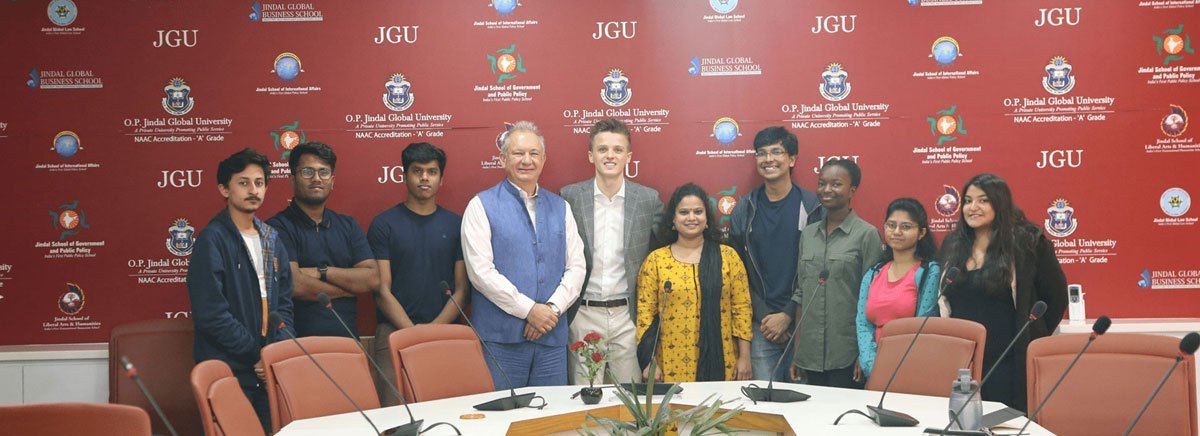The unassuming town of Sonipat, Haryana may not have been on anyone’s radar as a great education hub a decade ago. It was simply the place you stopped for a short break to enjoy the best paranthas in the world—Murthal’sfamous dhabas were the crowning glory of the district of Sonipat.
Then in 2009, Jindal Global Law School was launched as the first school of O.P. Jindal Global University, right amidst the green fields of Sonipat. Just 40 kilometres off the national capital and a short 15-minute drive away from those delectable paranthas, the evolution of legal education in India took a serious turn. Until not too long ago, there wasn’t much debate about the best law schools in India—the NLUs have long been the go-to law schools in the country. Yet in the past decade, a lot has changed. A new league of private universities has come up, offering world-class legal education—and the world is taking notice.
Just about a decade since its establishment, JGLS, in a historic moment, has put Sonipat on the global map charting the best in legal education. The QS World University Subject Rankings 2020 named Jindal Global Law School as the number one law school in India and among the top 150 across the world. National Law School of India University, Bengaluru, has taken second place in India. It’s the first time a private law school has achieved this—and you’re about to find out why.
If you’ve decided to study law, you already know there’s a lot to consider on the lookout for a good law school. Here’s a few winning reasons why students have been choosing Jindal Global Law School as the best law school in India:
- “The academic exposure is unparalleled”
-Chitrangda Singh, graduated from JGLS in 2016, now works as corporate lawyer
Studying law in a global, multidisciplinary university has many advantages. For starters, the curriculum is not restricted to the domestic setting. It takes a global approach. Coursework covers the nuances of legal developments in India viz-a-viz the world—giving a holistic perspective.
It’s not just the fundamentals of law you’ll be studying, but a variety of arts and humanities themes. The marriage of law and liberal arts creates a sound basis for students to interpret legal conversations in a broader sense. For instance, understanding human rights with a background in sociology, or learning about constitutional law having studied the history of the Indian constitution itself, or being able to grasp taxation law a little better on account of an introduction to economics.
As a multidisciplinary university, JGU offers an array of electives to law students. These are open across the different schools—international affairs, business, government and public policy, liberal arts & humanities, journalism & communication, art & architecture, banking & finance. Students combine various subject areas to go explore deeper linkages with law or venture into other areas that interest them. In fact, students can continue to audit elective courses if they’ve already met their credit requirements, or even before they’re mandated to—something not many universities afford.
The opportunity for research is abundant, with 55 plus research centres across the university. Many students take up multidisciplinary research projects to strengthen their resume and pursue their own intellectual curiosity. Further, the academic and research material, texts and sources inspire a deep focus on analysis and understanding beyond silos, to learn to look at the world in different ways.
- “The international faculty is the best in the country without any doubt”
–Chandragupta, spent a month at a National Law University before choosing JGLS
When a pool of different people with different ideas and backgrounds come together, something much bigger than the sum of the parts can be born. Variety is the spice of life. It’s the flavours of diversity that give JGLS a distinctive edge over many other law schools. Each of 328 faculty from 21 countries across the world brings with them something unique.
Trained at the best of global institutions, they come with a wide array of expertise and experiences. The value-add to student learning is immense, especially since faculty are engaged in research projects of their own. As the legal landscape changes in India and the world over, the flexibility of educators to grow and evolve in their own understanding of law is critical. So this gives rise to more contextual, relevant dialogues in the classroom that many traditional universities may lack.
Bottom line—a contemporary legal training is needed to succeed in today’s world. For the 21st century law student, this is the place to be.
- “Law firms give preference to hiring private law school graduates now, especially if they’re coming from JGLS”
-Sneha Bhavnani, JGLS alumnus, is a commercial lawyer with Aquilaw
Where you attended law school could make a stellar first impression at a job interview. The answer holds much more than a name. It can be very telling for a prospective employer to gauge the nature of training and exposure you’ve received.
JGLS has come to be known across academic and professional circles as a law school that produces top-notch graduates. Credit goes to the early batches who proved the ‘JGLS’ tag is worth its salt!
Leading national and international law firms like Cyril Amarchand Mangaldas, Khaitan & Co., Shardul Amarchand Mangaldas, AZB Partners, J Sagar Associates, Trilegal, White & Case and Herbert Smith Freehills have become some of the regular recruiters onboarding the bright young graduates of JGLS.
- “Professors train you to think, form your own ideas, debate and engage in meaningful discussion”
-Raveena Sethia, JGLS alumnus, practicing competition law at Shardul Amarchand Mangaldas & Co.
University education can be a dimensional shift from schooling—if done right. At JGLS, you’ll find no hand-holding. But you will find dedicated mentors who prepare you to excel in every sense, as a student, as a future professional, and perhaps most importantly, as an individual.
The days of dictation give way to a more dynamic classroom atmosphere at JGLS. You’re not simply instructed what to think, but asked to question and discover your own ideas. Learning comes alive through a spirit of discussion and debate.
The effects of engaged mentorship clearly show—law students from JGLS have a distinct persona. From the very way they express themselves to their ability to think creatively, analytically, to look at life through a multidisciplinary lens and be fearless in their dreams, they bring something special to the table. They are strong, articulate speakers, good listeners and clear writers. They are trained to be assertive yet creative, persuasive yet compassionate, unwavering yet empathetic.
- “I confess I’ve taken full advantage of the international exposure JGLS provides!”
-Harsh Nankani, attended Summer School at Columbia Law School & Melbourne Law School while at JGLS
Many young students harbour dreams of studying abroad. It does have a charm. It also offers a lot more than just academic excellence—which you can readily conquer while at JGLS. It’s the chance to gain new perspectives and have new experiences that definitely enriches the idea of studying in distinguished universities in distant lands. The importance of global exposure in a globalised world cannot be stressed enough.
Harvard, Yale, NYU, Cambridge, Columbia and Oxford are to name but a few of the leading foreign universities with which JGLS has joined hands to give students every opportunity possible.
Students make full use of over 155 international collaborations with top institutions across 36 countries—exchange programmes, summer and winter schools, study abroad programmes and dual degree programmes—many even attending more than one through their time at JGLS.
- “We’re practice-ready by the end of the programme”
-Aamer Sahni, studied at SRCC and worked at Bain & Co. before enrolling for the 3-year LL.B. at JGLS
Learning through case-study methods in the classroom, participating actively in moot court competitions across the world, engaging with experts from the field, and graduating with multiple internship experiences—the degree of practical exposure really packs a punch.
Experiential learning takes centre-stage at JGLS. This primes students to jump right into their professional roles once they graduate, and rise up the ranks more swiftly. Graduates will be well-versed with the specialisations of their choice. They’ll be adept with the professional requirements of the job as well, since a lot of learning that often happens ‘on-the-job’ will be covered through internships and intensive study.



